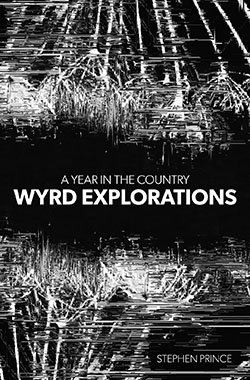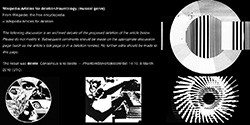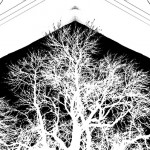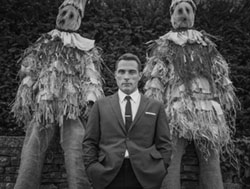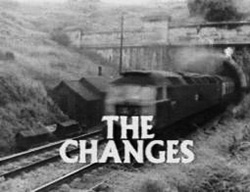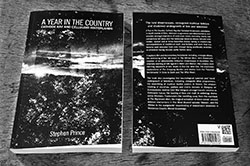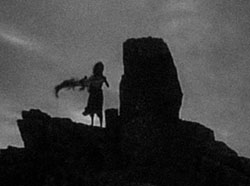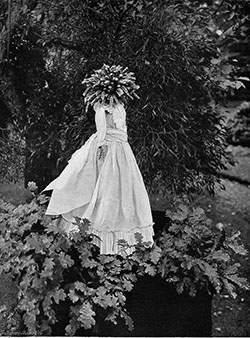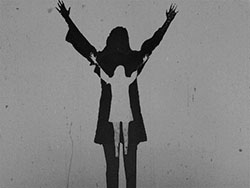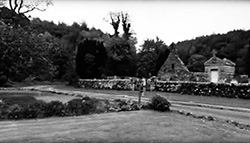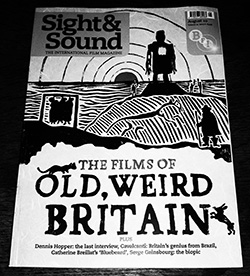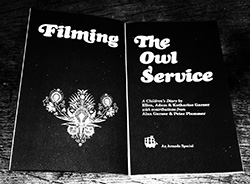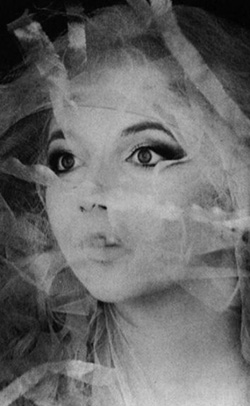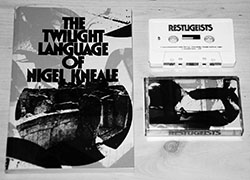 File under: Trails and Influences: Touchstones.
File under: Trails and Influences: Touchstones.
Case #23/52.
Now, I’ve been waiting for this particular book to arrive for a good year or two… and yesterday it did indeed do that.
One of the quotes on the back, from Bob Stanley, says “A must read for modernists, and for anyone who misses the future. This is the first book to really make sense of the fog of ideas that have been tagged as “hauntology”“.
And in but the first chapter, The Slow Cancellation Of The Future, it does start to de-fog those ideas. Thoughts and theories that I had but which I hadn’t quite been able to put all the jigsaw pieces together suddenly started to connect and form the picture on the front of the box.
In fact, there are enough ideas, clarification and de-fogging in those 27 or so pages to fill a book or two.
One of those “I don’t want to put this down” and looking forward to getting up in the morning so that you can read some more publications.
 So, where to start? Well, at the beginning I think… and with a quote or two from that most odd television series, which it would be even if it hadn’t been made for mainstream transmission, Sapphire and Steel…
So, where to start? Well, at the beginning I think… and with a quote or two from that most odd television series, which it would be even if it hadn’t been made for mainstream transmission, Sapphire and Steel…
“There’s no time here, not any more… This is the trap, it’s nowhere and it’s forever… Temporal anomalies are triggered by human beings’ predilection for the mixing of artefacts from different eras.”
Which is a somewhat apposite quote for the cultural times we live in and also quite possibly hauntology as a cultural idea and project.
“In conditions of digital recall, loss itself is lost… It is no longer necessary to physically move in order to access the whole history of culture…”
“ It was through the mutations of popular music that many of us who grew up in the 1960s, 70s and 80s learned to measure the passage of cultural time…
“…it doesn’t feel as if the 21st century has started yet. We remain trapped in the 20th century… in 1981, the 1960s seemed much further away than they do today… cultural time has folded back on itself, and the impression of linear development has given way to a strange simultaneity…
 Or to semi-quote William Gibson, music and culture have become atemporal.
Or to semi-quote William Gibson, music and culture have become atemporal.
“Why did the arrival of neoliberal, post-Fordist capitalism lead to a culture of retrospection and pastiche?… Could it be that neoliberal capitalism’s destruction of solidarity and security brought about a compensatory hungering for the well-established and familiar?
 “…the intensity and precariousness of late capitalist work culture leaves people in a state where they are simultaneously exhausted and overstimulated…
“…the intensity and precariousness of late capitalist work culture leaves people in a state where they are simultaneously exhausted and overstimulated…
“Despite all it’s rhetoric of novelty and innovation, neoliberal capitalism has gradually but systematically deprived artists of the resources necessary to produce the new… If there’s one factor above all else which contributes to cultural conservatism, it is the vast inflation in the cost of rent and mortgages…”
Phew, about time somebody actually properly talked about this. He goes on to say how it was no surprise that in the late 1970s/early 1980s there was a huge upsurge in creative innovation in New York and that this happened at a time when rents were cheap and accessible.
Although I don’t know Mark Fisher’s personal financial situation (and that’s his right and choice to keep that private), I find it interesting that a book/set of thoughts as well-developed as The Ghosts Of My Life has been penned by somebody who, according to the short biography at the front, is employed in academic institutions.
They could be seen as one of the last bastions where the resources for new thought, dreaming and exploration hasn’t been as restricted. Unfortunately, that space to dream and explore is being paid for in part by the future debts of some of its participants rather than being factored in/acknowledged/respected and dare I say it, funded, as part of societies needs.
Curiously, when you think about it, all this space for cultural expression via new digital forms has at the same time often brought about a big reduction in and/or few viable business models that underpin those forms for the creators of the content and culture that make them interesting and viable; plenty of cash for those who design/produce/market etc the physical devices and delivery systems, pin money for those who fill and supply them.
The monetary side of how people create cultural work and also fill the cupboards and keep the lights on isn’t something that’s generally considered or discussed in interviews… it’s like some dirty little secret but without the correct underpinning it’s hard for the work to happen and/or for the whole process to be socially inclusive.
(That inclusion of people from less financially cushioned backgrounds is something which Mark Fisher also touches on in terms of its degradation and decay in recent decades in this first chapter… well I was saying there are enough ideas in this one chapter to fill a book or two… as an illustration of that I think this Day/post about it contains the most words of any post so far in this A Year In The Country journey ).
“Producing the new depends upon certain kinds of withdrawal from, for instance, sociality as much as from pre-existing cultural forms but the currently dominant form of socially networked cyberspace, with its endless opportunities for micro-contact… has made withdrawal more difficult than ever before… in recent years, everyday life has sped up but culture has slowed down…”
Bleep bleep bleep (x near infinity).
 “Why hauntology?… When it was applied to music culture – in my own writing and in that of other critics such as Simon Reynolds and Joseph Stannard – hauntology first of all named a confluence of artists. The word confluence is crucial here. For these artists – William Bansinski, The Ghost Box label, The Caretaker, Burial, Mordant Music, Philip Jeck, amongst others – had converged on a certain terrain without actually influencing one another. What they shared was not a sound so much as a sensibility, an existential orientation…
“Why hauntology?… When it was applied to music culture – in my own writing and in that of other critics such as Simon Reynolds and Joseph Stannard – hauntology first of all named a confluence of artists. The word confluence is crucial here. For these artists – William Bansinski, The Ghost Box label, The Caretaker, Burial, Mordant Music, Philip Jeck, amongst others – had converged on a certain terrain without actually influencing one another. What they shared was not a sound so much as a sensibility, an existential orientation…
Which I think is something I was trying to root out and get out in my previous post (see Day #162/365); what has been labelled hauntology isn’t a strictly defined thing but those who have been associated with it do share an interconnected but disparate vision or interests. Sometimes there’s something in the air culturally that people somehow connect with at the same time even though they have not physically or consciously been aware of what the others are doing along similar lines (another example from a different culture was Madness and The Specials both coming to a kind of mutated version of ska music and culture at similar times in the late 1970s before they met and worked together).
 “The artists that came to be labelled hauntological were suffused with an overwhelming melancholy… As to the deeper cause of this melancholia, we need look no further than the title of Leyland Kirby’s album: Sadly, The Future Is No longer What It Was. In hauntological music there is an implicit acknowledgement that the hopes created by postwar electronica or by the euphoric dance music of the 1990s have evaporated – not only has the future not arrived, it no longer seems possible. Yet at the same time, the music constitutes a refusal to give up on the desire for the future. This refusal gives the melancholia a political dimension, because it amounts to a failure to accommodate to the closed horizons of capitalist realism…
“The artists that came to be labelled hauntological were suffused with an overwhelming melancholy… As to the deeper cause of this melancholia, we need look no further than the title of Leyland Kirby’s album: Sadly, The Future Is No longer What It Was. In hauntological music there is an implicit acknowledgement that the hopes created by postwar electronica or by the euphoric dance music of the 1990s have evaporated – not only has the future not arrived, it no longer seems possible. Yet at the same time, the music constitutes a refusal to give up on the desire for the future. This refusal gives the melancholia a political dimension, because it amounts to a failure to accommodate to the closed horizons of capitalist realism…
“Haunting… can be construed as a failed mourning. It is about refusing to give up the ghost or… the refusal of the ghost to give up on us. The spectre will not allow us to settle into/for the mediocre satisfactions one can glean in a world governed by capitalist realism…
“What has vanished is a tendency, a virtual trajectory. One name for this is popular modernism… popular culture definitively established that it did not have to be populist….
“The kind of melancholia I’m talking about… consists not in giving up on desire but in refusing to yield. It consists… in a refusal to adjust to what current conditions call ‘reality’ – even if the cost of that refusal is that you feel like an outcast in your own time…”
These passages are part of the book’s expression of anger at the ways things have become in society and culture, the current discarding of popular modernism and it’s sense of a progressive, inclusive direction in society and how in part hauntology may be a response or resistance to that.
The anger isn’t presented in a hectoring form, rather as reasoned and thought-provoking arguments/observations, accompanying which the academic/theoretical considerations of the book are presented in an accessible, inclusive manner and language.
“Music culture was central to the projection of the futures which have been lost. The term music culture is crucial here, because it is the culture constellated around music (fashion, discourse, cover art) that has been as important as the music itself in conjuring seductively unfamiliar worlds.”
In many ways much of the culture around hauntology has attempted to recapture a holistic form of culture, to create those “seductively unfamiliar worlds”. The visual aesthetics and physical objects that contain and present some of the associated music has come to be of great importance, of equal if not sometimes more so than the music it contains.
Curiously in this case those “unfamiliar worlds” have often been created by reinterpreting and reusing the familiar from times gone by, whether visually or in terms of sounds. You could say they are haunted by spectres of the past (which kind of neatly brings me back to the origin of the word hauntology).
I expect I may well be revisiting the pages and thought of Ghost Of My Life somewhere and sometime around these parts…
Visit Ghosts Of My Life in the ether here. Read an extended extract from the first chapter here. Read more digital missives and considerations from Mark Fisher here. Visit Laura Oldfield Ford (who illustrates the book) and her Savage Messiah work here.







